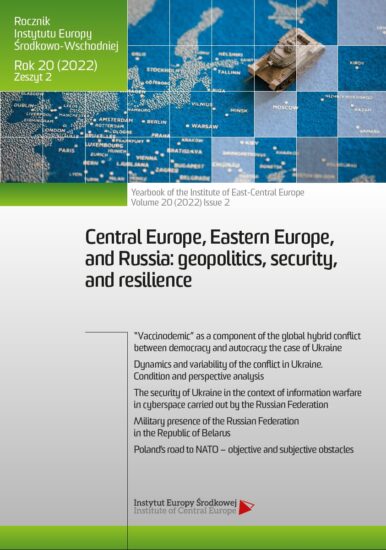Nationalities relations in a totalitarian
state. The case of East Central Europe
under Soviet occupation (1939-1941)
– methodological issues
and a research agenda
Nationalities relations in a totalitarian
state. The case of East Central Europe
under Soviet occupation (1939-1941)
– methodological issues
and a research agenda
Author(s): Marek WierzbickiSubject(s): Politics / Political Sciences, Politics, History, Political history, Recent History (1900 till today), Government/Political systems, Peace and Conflict Studies
Published by: Instytut Europy Środkowej
Keywords: nationalities relations; totalitarian state; Soviet occupation; East Central Europe; methodological issues; research agenda
Summary/Abstract: The aim of the article is to present the specific nature of researchon the issues of national relations in a totalitarian state based on the exampleof the lands of Central and Eastern Europe under the Soviet occupation from1939-1941. In order to achieve this, the literature on the subject (in English andPolish) was reviewed as well as the most important methodological problemsencountered by researchers. The research program was also outlined, alongwith a proposal for their conceptualization in the form of signalling the mainaspects of the above-mentioned issues, including the specificity of the Sovietoccupation of 1939-1941, social and ethnic relations in this area, and the Soviet nationalities policy. Several research methods and postulates were proposed, as well as perspectives and theoretical approaches that could facilitatethe study of this complex and controversial subject, e.g., the interdisciplinarynature of research, methods of bottom-up formation of political attitudes ofthe population (the so-called “bottom-up” method), application of theoriesof the totalitarian state, and different theories of ethnicity. As a result, an interdisciplinary program of comparative studies of ethnic relations in Centraland Eastern Europe under Soviet rule (1939-1941) was outlined, taking intoaccount the transnational character of historical processes and the need toconduct micro historic analyses and case studies that would allow capturingof the diversity of ethnic relations and verify the effectiveness of the policyof the central Soviet authorities. The article argues that it seems obvious thatthe specificity of the analysed problematics can be properly grasped only byconsideration it in the historical and theoretical context, adopting a comparative and transnational approach, from a micro-historical as well as every day-life perspective that highlights the most important social factors whichfacilitated changes in interethnic relations.
Journal: Rocznik Instytutu Europy Środkowo-Wschodniej
- Issue Year: 20/2022
- Issue No: 2
- Page Range: 205-232
- Page Count: 28
- Language: English

